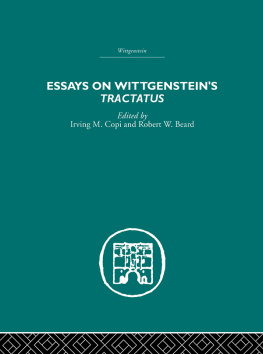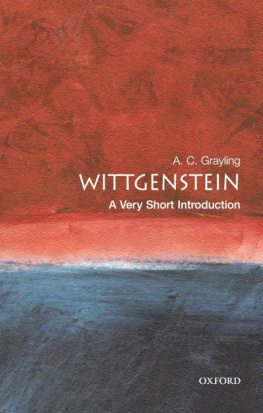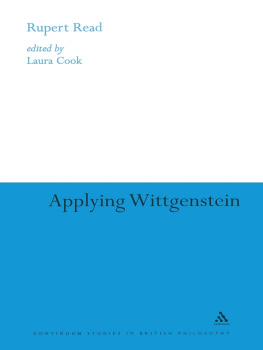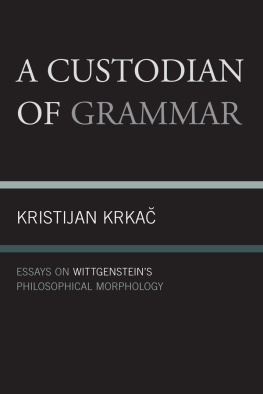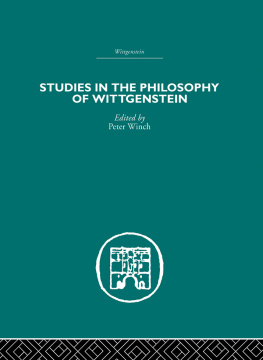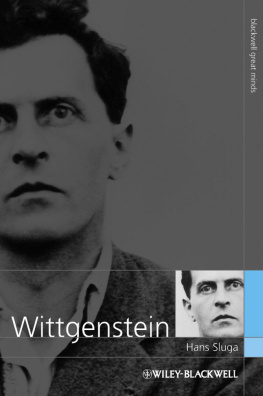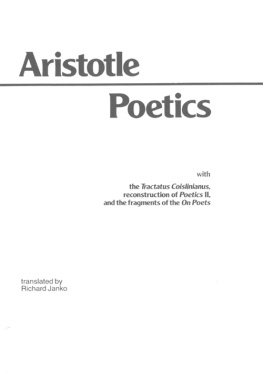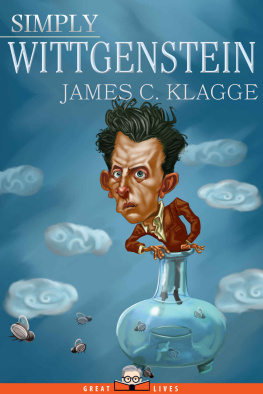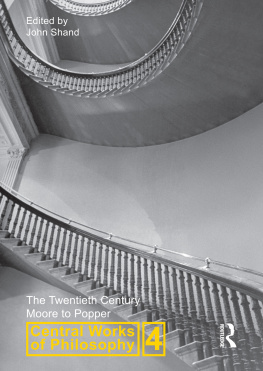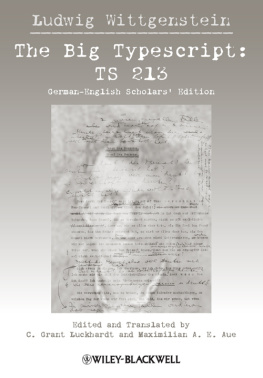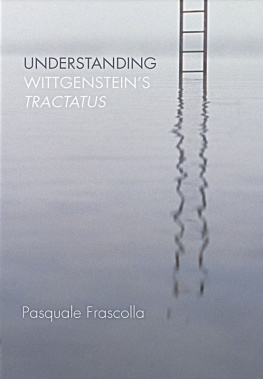ESSAYS ON WITTGENSTEINS
TRACTATUS

ROUTLEDGE LIBRARY EDITIONS
WITTGENSTEIN
| Essays on Wittgensteins Tractatus | Edited by Irving M. Copi and Robert W. Beard |
| Marx and Wittgenstein: Social praxis and social explanation | D. Rubinstein |
| Studies in the Philosophy of Wittgenstein | Edited by Peter Winch |
| Wittgenstein: To follow a rule | Edited by Steven Holtzman and Christopher Leich |
| Wittgenstein: A critique | J.N. Findlay |
| Wittgenstein and Modern Philosophy | Justus Hartnack |
| Wittgensteins Philosophy of Language: Some aspects of its development | James Bogen |
| Wittgenstein and the Turning-Point in the Philosophy of Mathematics | S.G. Shanker |
ESSAYS ON WITTGENSTEINS
TRACTATUS
Edited by
Irving M. Copi and Robert W. Beard

First published in 1966
This edition first published 2006
by Routledge
2 Park Square, Milton Park, Abingdon, Oxon, OX14 4RN
Routledge is an imprint of Taylor & Francis Group
Transferred to Digital Printing 2007
1966 Irving M. Copi and Robert W. Beard
All rights reserved. No part of this book may be reprinted or reproduced or utilized in any form or by any electronic, mechanical, or other means, now known or hereafter invented, including photocopying and recording, or in any information storage or retrieval system, without permission in writing from the publishers.
The publishers have made every effort to contact authors and copyright holders of the works reprinted in the Wittgenstein series. This has not been possible in every case, however, and we would welcome correspondence from those individuals or organisations we have been unable to trace.
These reprints are taken from original copies of each book. In many cases the condition of these originals is not perfect. The publisher has gone to great lengths to ensure the quality of these reprints, but wishes to point out that certain characteristics of the original copies will, of necessity, be apparent in reprints thereof.
British Library Cataloguing in Publication Data
A CIP catalogue record for this book is available from the British Library
Essays on Wittgensteins Tractatus
ISBN 0-415-38279-3 (volume)
ISBN 0-415-38278-5 (set)
Routledge Library Editions: Wittgenstein
ESSAYS ON WITTGENSTEINS
TRACTATUS

LUDWIG WITTGENSTEIN
circa 1908
By kind permission of Mr. W. Mays
ESSAYS ON Wittgensteins
Tractatus
Edited by
IRVING M. COPI
University of Michigan
and
ROBERT W. BEARD
Florida State University

First published in 1966
by Routledge
2 Park Square, Milton Park,
Abingdon, Oxon, 0X14 4RN
Irving M. Copi and Robert W. Beard
No part of this book may be reproduced in any form without permission from the publisher except for the quotation of brief passages in criticism
Contents
Gilbert Ryle
Frank P. Ramsey
Theodore de Laguna
Ludwig Wittgenstein
John Wisdom
Julian Bell
Julius R. Weinberg
Willis Moore
Max Black
Edna OShaughnessy
Ellis Evans
B. F. McGuinness
Jaakko Hintikka
Irving M. Copi
Irving M. Copi
G. E. M. Anscombe
Edwin B. Allaire
Ellis Evans
George L. Proctor
Judith Jarvis Thomson
Richard J. Bernstein
Wilfrid Sellars
H. R. G. Schwyzer
David Keyt
D. S. Shwayder
Erik Stenius
Edwin B. Allaire
Gustav Bergmann
Eddy Zemach
David Keyt
LUDWIG WITTGENSTEINS Tractatus Logico-Philosophicus was published over forty years ago, yet interest in it seems to be increasing rather than diminishing with passage of time. This is remarkable in view of the enormous impact it has already had on philosophical thought during the first half of the century.
The Tractatus profoundly influenced several major contemporary philosophical movements. Bertrand Russell has repeatedly acknowledged his indebtedness to Wittgenstein for some of the basic ideas of Logical Atomismideas that are embodied in the Tractatus and that are still being presupposed, criticized, or defended in current issues of leading philosophical journals. The earliest Logical Positivists, members of the Vienna Circle, devoted themselves for a time to the study of the Tractatus, though the extent to which they understood its fundamental teachings is a matter still being debated by philosophers today. Much of what is loosely called Oxford Philosophy or Ordinary Language Philosophy can be appreciated only as reaction to and struggle against the linguistic doctrines of the Tractatus. Still other analytical philosophers who are not to be identified as either logical atomists or positivists or ordinary language philosophers have been strongly influenced by the conception of philosophy set forth in the Tractatus.
Quite apart from the historical influence it has had the Tractatus is of interest and importance in its own right. There is room for disagreement, however, as to what is most important in it. What one holds to be of greatest significance in the Tractatus will depend in great measure upon ones interpretation of that work and ones assessment of the correctness of its doctrines. We have no intention in these introductory remarks of trying to settle any issues of interpretation or evaluation of specific doctrines. We are more interested in indicating the aims and scope of the work.
The significance of the Tractatus in the twentieth century may fruitfully be compared with that of Descartes works in the sixteenth. Each of the two men developed a genuinely philosophical response to an important contemporary intellectual achievement that was a turning point in the total culture of the West. Descartes responded to the new mathematical physics produced by Copernicus and Galileo which not only changed mans conception of the world in which he lived, but was destined to change the world itself with the technology it brought in its train. Wittgenstein responded to the new mathematicallogic produced by Frege, Whitehead, and Russell which not only changed mans conception of the nature of mathematics and logic but promises (or threatens) to change the world with the new cybernetic devices of computers and automata whose design and construction is made possible by the new mathematical logic. It does not seem to have been sufficiently realized as yet that the mathematical logic to whose development Wittgenstein contributed, and the mathematical physics to whose development Descartes contributed, are of the same order of magnitude as revolutionary intellectual forces making for radical social change.
Next page
